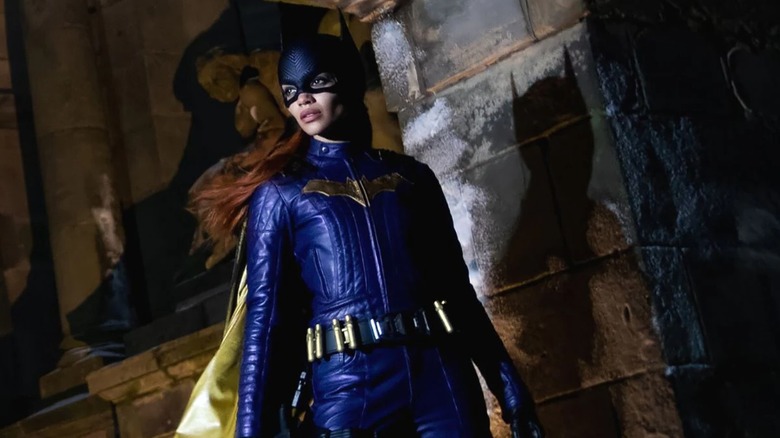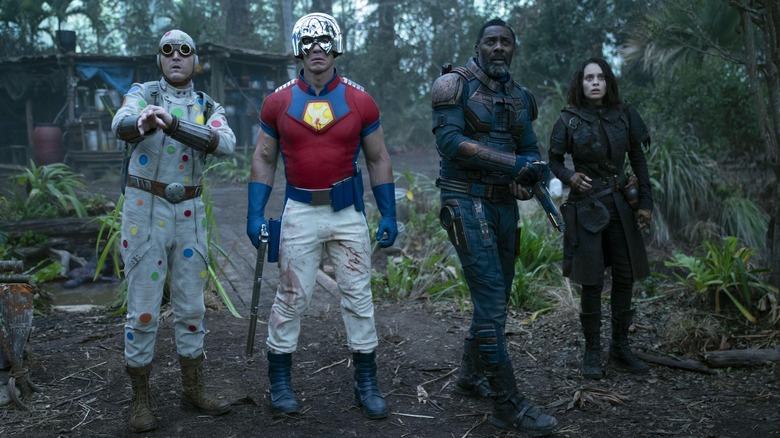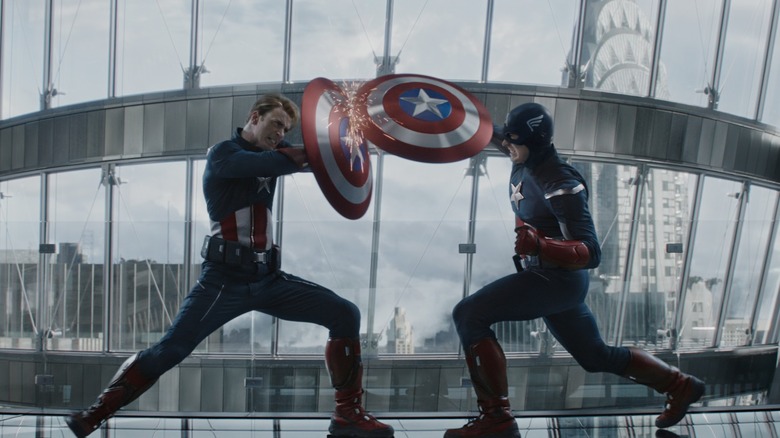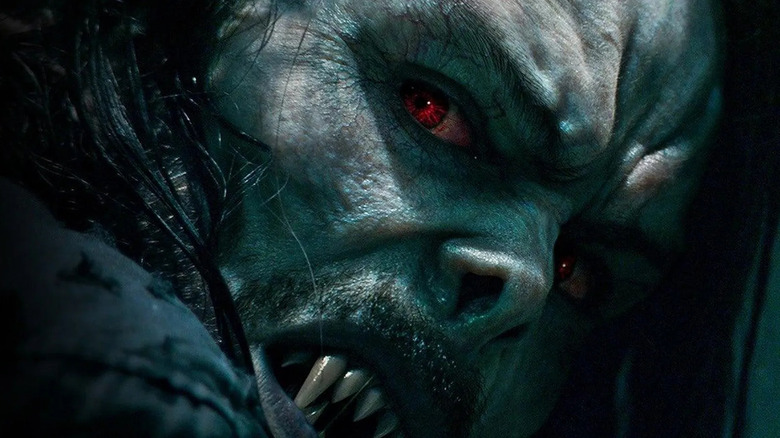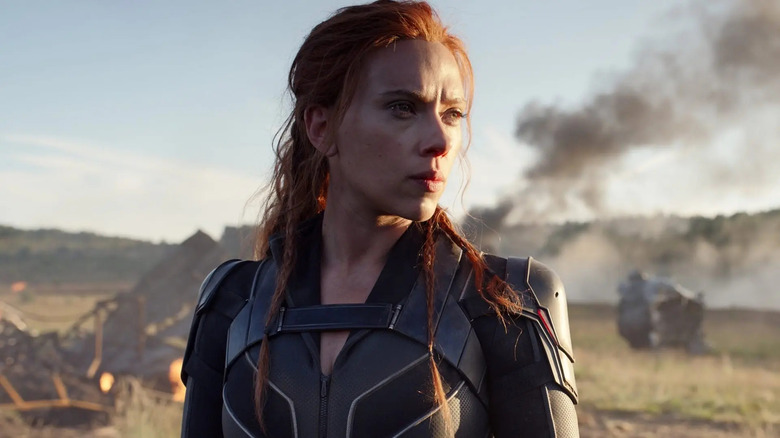Does The Warner Bros. Batgirl Situation Mark The End Of Superhero Movie Dominance?
It was announced on August 2 that "Batgirl," originally scheduled for release later this year, has been scrapped entirely. Although nearly complete, and covered optimistically in press releases only a few weeks ago, Warner Bros. has elected to nix the project. This news accompanies other mysterious blows to the current Warner Bros. catalogue, including the cancellation of a "Scoob!" sequel and the vanishing of several notable HBO max originals from their streaming service. The studio seems to be having their own Crisis on Infinite Earths.
The cancelation of "Batgirl," however — while perhaps baffling — may denote a new trend that has been playing itself out for the past few years. Already $90 million deep, Warner chose to shelve the film rather than spend the additional money it would take to market and release it, either to theaters or streaming. It seems that a superhero film — a genre that has utterly dominated the film landscape for the better part of 15 years — will no longer warrant theatrical distribution unless it's a guaranteed billion-dollar hit. "Batgirl," even with the inclusion of Michael Keaton reprising his role as Bruce Wayne, isn't that hit.
One can speculate as to whether or not "Batgirl" will ever be revived — And who knows? Perhaps Warner will reopen the project tomorrow — but the mere announcement of its cancelation carries with it a sign that the genre, at long last, may be contracting. If a $90 million Batman spin-off can be flung aside in so cavalier a fashion, then maybe ... just maybe ... superheroes simply don't possess the value they once did.
Predictions in the past
Of course, pundits, filmmakers, and journalists have been predicting the downfall of superhero cinema almost from the start. In July of 2021, in an article in the British newspaper Express, James Gunn, the director of "The Suicide Squad" and "Guardians of the Galaxy," pointed out that superhero movies were nearly at an end, citing the lifecycle of westerns and war films as precedent. The Guardian predicted that the spread of COVID could spell out the end of the genre in 2020 (when several notable superhero projects were shunted onto streaming services).
Rolling Stone quizzed readers on superhero fatigue in 2016. Steven Spielberg predicted that superhero movies would inevitably vanish back in 2015. On RogerEbert.com, author Michael Marisol felt that superheroes were about to collapse under their own weight following the release of "The Avengers" way back in 2012. And A.O. Scott, in the New York Times, posited that there were already too many high-profile superhero movies ... in 2008. That was prior to the existence to the MCU, the Snyderverse, and the Multiverse of Madness.
Genres tend to loom large in the public consciousness for about 20 years, and then retire to occasionally-visited subgenre exercises and deconstructionist riffs. Westerns are often cited as the first example (as Gunn did above), as their popularity was overwhelming from the '30s through the early '60s, and then experienced a sharp drop-off. Throughout the '50s, large-scale Biblical/Roman epics were in vogue. Fantasies based on hot YA novels are kind of over, having once dominated the landscape for the bulk of the '00s. There comes a time when all genres simply fall out of vogue. No matter how popular, everything has an expiration date.
(Except for horror movies, which are always in vogue)
But this is different
But the "Batgirl" situation makes the predicted downfall of superhero cinema feel like a little bit more than idle postulation. This is more than tracing trends and recognizing cycles in cinema history. This time, something feels like it's being shut off. When a film the size of "Batgirl" is thrown away, perhaps the studios are expressing a lack of faith in the genre at large. Perhaps ... superheroes are actually reaching the contraction point.
The following observation is anecdotal at best, but one may be able to sense a shift in the air. Following the climactic "Avengers: Endgame" in 2019, the MCU has, some have felt, gone adrift. Disney released an entire "phase" of MCU movies without announcing a "finale," leading many online pundits to wonder where the series was going. "Avengers: The Kang Dynasty" and "Avengers: Secret Wars" were announced, and an indifferent public marked their calendars and prepared to wait. Not in excitement, but out of a sense of weary obligation. The Guardian posited that Marvel fatigue is long over, and we are now in the phase of Marvel exhaustion. There are, of course, many people who will see these movies, and film journalists will continue to cover them with professionalism and insight, but — in an ineffable way — joyous enthusiasm seems to be at a low ebb. Find me the fan of any age who is as excited about "Kang" as they were about "Infinity War."
The Morbius effect
But "Batgirl" goes beyond a sense of weary fatigue as well. This is the actual cancelation of a project. This is the announcement that a superhero movie — long held as untouchable champions of at the box office — was not even worth the time. Only a few short years ago, a hit film like "Ant-Man" (which made half a billion dollars worldwide) was considered a "lesser" movie. Now, after a general waning of interest and several high-profile failures, the owners of Batman are giving up ... on a Batman movie.
The clearest crack in the façade might have been the release of "Morbius" earlier this year. "Morbius," while ultimately making over $163 million worldwide, was proof positive that not all superhero movies are going to be accepted by the public or met with enthusiasm merely because of their interconnectivity to other movies (The Vulture from "Spider-Man: Homecoming" appears in a post-credits stinger). Indeed, the film was mocked endlessly (remember #MorbiusSweep?). "Morbius" wasn't the film to topple the genre, but its overall failure might have been the predictor that superheroes are shriveling.
If the failure of "Morbius" can serve as a dark mirror to the success of "Iron Man" in 2008, then the cancelation of "Batgirl" may serve the as the reflection of the Disney/Marvel buyout of 2009. One was the opening of new possibilities. The other is the brusque cutoff of old ones. A major studio, known for huge amounts of superhero output, will now not make as many of those movies. As far as the public knows, "The Flash" will still hit theaters, but now everything feels up in the air. Is the DCEU even a thing anymore?
The COVID contraction
The major shift, of course, likely happened during COVID. During the height of COVID-related lockdowns, "Wonder Woman 1984" and "Black Widow" were pushed to streaming, leading to great losses for the studios and even a lawsuit from "Widow" actress Scarlett Johansson. Studios began shifting their financial focus toward streaming and away from theatrical numbers; They had to. Theaters were closed. And, with the advertising/release cycle of over-hyped superhero fare now dramatically interrupted, the freight train derailed. The 2021 release of the ballyhooed Snyder Cut of "Justice League" also proved that a high-profile, in-demand project could be released on streaming ... and not necessarily be successful. The actual numbers, unlike most superhero films, couldn't really be accurately gauged.
Perhaps all these theories will be proven wrong. Perhaps the above trends were all mere hiccups in a genre that is destined to dominate the theatrical landscape for decades to come. Perhaps a rebooted version of "Iron Man" will come along and get the public's imagination revving again. Perhaps the cancelation of "Batgirl" will be a good thing. We haven't seen it. Perhaps it's merely "Morbius" levels of bad.
Or perhaps we can accept that superheroes have outlived their cultural usefulness. Following 9/11, superheroes became popular as a widespread cultural fantasy, envisioning a world of simple morals, and superpowered beings who were present to stop any kind of destructive nationwide disaster. Those cathartic Avenging fantasies are now only a distant element of superheroes. The genre has become, like "Star Wars," about its own complicated machinations and nothing else. Fans attend to see the jigsaw puzzle pieces put together.
For the first time, studios and fans may agree that no one wants to see the completed picture anymore.
